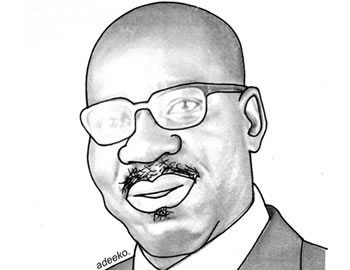NO country can grow and prosper economically without a sustainably favourable environment that enables business to thrive. Indeed, no state can flourish economically and progressively improve the socioeconomic condition of its people if it lacks workable economic policies and business-friendly atmosphere.
To engender economic prosperity, those who drive the machinery of government must manifestly see to it that they constantly initiate and implement policies that make for the thriving of business and competitiveness, and continually address challenges that may hamper the booming of business even as they beat every path of available opportunities therein. To do otherwise is to stagnate, nurture poverty, and worsen the human condition.
The foregoing position is a fitting summary of the strongly considered conclusions of a notable organisation, PricewaterhouseCoopers (PwC), based on a report of its findings in a recently conducted study in the area of State-Level Business Environment.
Entitled “Promoting Economic Prosperity: Analysis of the State-Level Business Environment in Nigeria,” the report provides findings from the State-Level Business Environment Analysis carried out in four different states of Anambra (South-East), Edo (South-South), Ogun (South-West), and Niger (North Central).
PwC’s 2017 study was informed by two specific objectives, viz to “[i]dentify challenges and opportunities for doing business, and examples of good practices in the focus states; and provide key recommendations as to how the United Kingdom (UK) can broaden prosperity and commercial engagements that help Nigerian states make the most of their economic development opportunities”.
It must be noted that the report is “a sequel to the March 2016 publication [of PwC] which evaluates the key sectors of opportunity for UK businesses in Nigeria”.
In drawing its conclusions based on its findings with regard to the realities of the business environment from each of the focused states, the agency informed that it “used a combination of quantitative analysis of publicly available data as well as insights gathered from interviews with a sample of private sector companies, key state parastatals, business and trade groups, and development agencies.”
For each of the states, the study reveals that certain positive efforts are already in place and others are being taken to nurture such business-friendly environment that encourages effective competitiveness, motivates investment and boost investors’ confidence and, consequently, realise economic prosperity for the people.
In the case of Edo State, which is the focus of this piece, the study explicitly affirmed the fact that the state government demonstrates renewed interest in significantly improving the business environment in the state through workable policies and decisive engagement of the challenges in the business sphere.
It captured the unembellished and unfeigned reality that the state government has a deep business-oriented consciousness, hence its organised move to improve and build public infrastructure, expand revenue base, improve the capacity of the workforce, and provide incentives that attract investors.
This is not any surprising when viewed against the backdrop of the fact that Governor Godwin Obaseki is a business-oriented mind with a rich trove of experience in the private sector. It is this background that the man brings to the service of the state as its chief executive officer.
As the study rightly observed, the Obaseki administration wastes no time in walking the path of economic prosperity for the state. Within three months of taking office, the administration was able to perfect a trade mission to China in order to attract relevant investors to the state. As every business-inclined entity is wont to do, the outlined goal of making Edo State an emporium of economic prosperity within the South-South region is being undertaken through a carefully mapped-out plan of institutional reforms, economic revolution, culture and tourism, environmental sustainability, socio-welfare enhancement, and infrastructure development. This inclusive governance structure, as the PwC report describes it, is the administration’s way of ensuring that it avoids a one-sided, limiting development culture.
Similarly, it is worthy of note that the commitment of the Obaseki administration, like its immediate predecessor, to the socioeconomic development of Edo State is not a ruse. In other words, the vision is not a feel-good idea for which the government has no means of actualising it.
As the PwC report asserted, “Edo state has abundant resources to support its prosperity agenda,” the government is keenly aware of this and it is methodically and consistently taking the right step to make judicious use of the resources.
One of those resources being effectively harnessed for the economic development of the state is in the area of agriculture. The Agripreneur Programme initiated by the government is a worthy example of how it is using available resources to transform the state economically and considerably reduce unemployment.
This point is clearly made by the state’s Ministry of Budget and Planning: “Agriculture and agriculture processing is a main focus of the current administration because of the large agricultural endowments: there is land and also because the country is in dire need of food.
“With over 2 million hectares of arable land,” the PwC report notes, “the state is well positioned to enjoy strong expansion in crop production including oil palm, rubber and cassava. Deposits of limestone, marble, gypsum, feldspar and granite among others have also been reported to exist in abundance in the state. The state houses major Agro-allied companies in Nigeria including Presco, Okomu Oil and PZ-wilmar with large expanse of oil palm and rubber plantations. The government has begun efforts to increase the agricultural output of the state through the provision of incentives for investors and active partnerships for the development of the agricultural value chain.”
Additionally, the development of a major seaport is another means through which Edo State under Governor Obaseki is creating a business-favouring environment for the prosperity of the Edo people. The Gelegele Seaport has as its major features an agribusiness development park, marine facilities, an inland port, and supporting infrastructure and facilities.
Already, since large conglomerates such as BUA and Dangote group consider the state an attractive investment destination, according to PwC, it may yet emerge “as a trade hub for the southern region with significant impact on its prosperity.”
To achieve its objectives through agriculture, the state government must also heed the concerns respondents raised as contained in the PwC report. According to them, what constrain business in the agricultural sector include “insufficient funding, limited agriculture research, poor network of feeder roads and inadequate skills and funding to upgrade the agriculture sector.”
In the area of revenue, the state government is deeply uncomfortable with the envelop economy that ensures that its biggest source of revenue comes from the monthly statutory federal allocation to states. This disinterest in depending solely on Abuja for big income has inspired a coordinated move towards aggressive improvement in the state’s Internally Generated Revenue (IGR).
As the report reveals, the state reduced its major source of revenue from monthly allocation from 80 per cent in 2011 to 55 per cent in 2016, adding that “during the review period,” the state’s IGR “increased by only 5.4 per cent annually, which was below the zonal average annual growth of 8.2 per cent.”
What this presupposes is that Edo State must intensify and sustain its efforts to expand its income base. Every creative means necessary must be explored to achieve, for in the view of the researchers of that study, it “requires significant increases to its IGR and total revenue to meet both recurrent and capital expenditures.” It cannot afford to relent in its legitimate strive to expand its revenue portals if the prosperity it hankers for is to materialise.
- Mayaki writes from Benin City.






